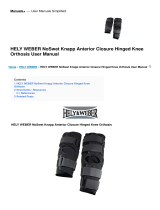A37802
Lerman Non-Invasive Halo
Instructions and User Guide
25546-001 REV L 2022-05-23
Trulife www.trulife.com Page 4 of 4
DISPOSAL
There are no hazardous materials in the device. Comply with local and national laws and regulations.
LEGAL INFORMATION
The use of this class 1 medical device is subject to the respective national laws of the country of use and may vary accordingly.
The user of this device should report any serious incident to Trulife and the competent authority of the country of use.
Trulife MDSS GmbH
3225 Woburn St. Suite 160 Schiffgraben 41
Bellingham, WA 98226 30175 Hannover
USA Germany
Phone (+1) 360 697 5656
LIMITED WARRANTY
Trulife warrants that the PRODUCT will be free from defects in material and workmanship from the date of installation for the
warranty period stated on the PRODUCT warranty card.
This warranty will not apply if the PRODUCT has been damaged by misuse, abuse, neglect, improper care, failure to follow
instructions, abnormal wear and tear, or in the event that the PRODUCT has been modified/repaired by persons unauthorized by
Trulife.
If a defect in material or workmanship is found during the warranty period, Trulife will, at Trulife’s option, either repair or replace
the product. If it is not possible to repair or replace the product, Trulife will be limited to refunding the purchase price.
Trulife will not be liable under any legal theory for any direct, indirect, special, incidental or consequential damages arising from the
use of or inability to use this product.
The application guidelines for this Trulife product are for the use of and by a certified, qualified practitioner only. Patients are not to
attempt to apply or adjust the item unless expressly instructed to do so by the practitioner responsible for the prescription and/or
initial fitting of the device. All patient questions should be referred to the practitioner and not to the manufacturer. The
manufacturer warrants only that the enclosed product has been inspected for quality and can be effective for certain indications,
but final decisions and ongoing monitoring must be made by the medical professional(s) prescribing and/or fitting the device to
determine its effectiveness for an individual patient. Patient compliance is an integral part of the entire protocol and must be
adhered to in order to avoid potential problems and to maximize the effectiveness of the prescribed product.
As a condition of the sale of any Trulife product, this product is restricted to a “Single Patient Use Only” by the originally fitted
patient in order to protect the care provider and the patient against potentially adverse consequences of infectious disease
transmission, material instability in adapting to the configuration of the original user and/or decrease in effectivity. Any express or
implied warranties are voided if the product is reused or fitted to another patient. Additionally, a license of right to use under any
relevant patents pertaining to the product is terminated with the cessation of use by the original patient. As with all Trulife
products, this product must be prescribed and applied by a qualified practitioner to determine it meets the needs of the particular
patient and accomplishes the desired results.










